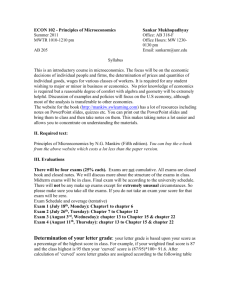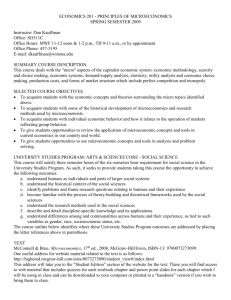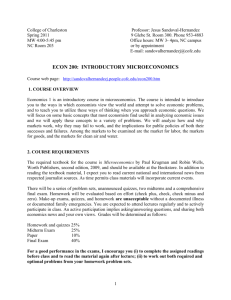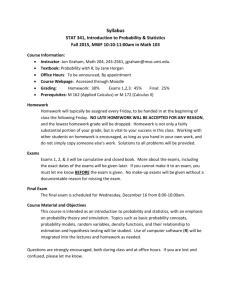EC151 - Principles of Microeconomics
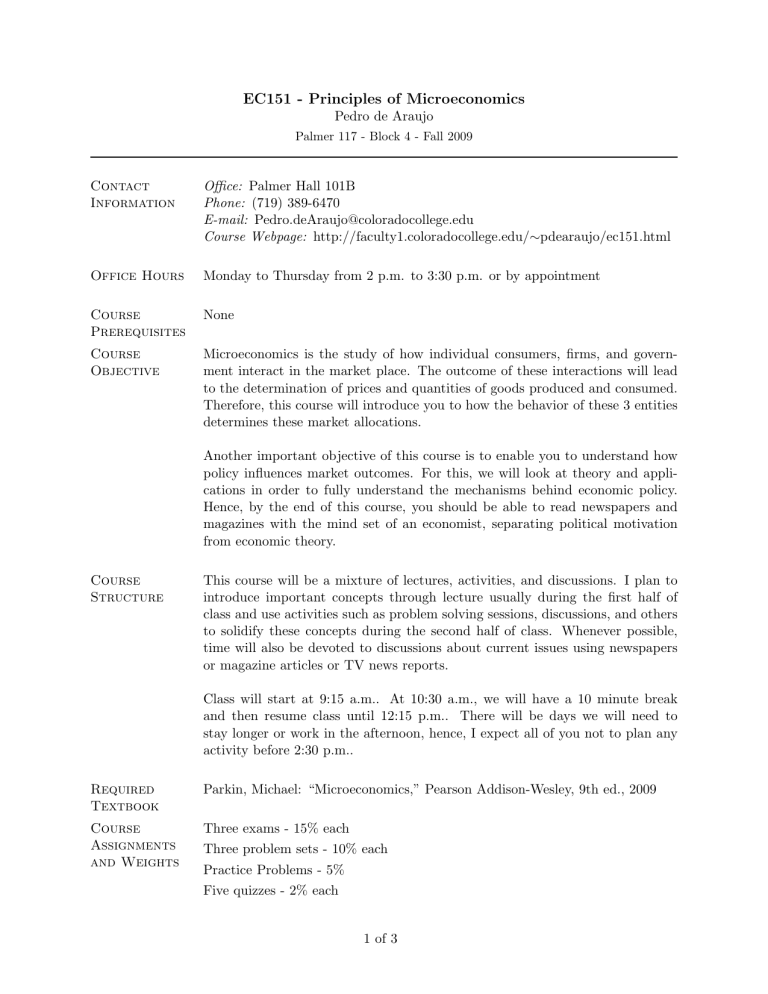
EC151 - Principles of Microeconomics
Pedro de Araujo
Palmer 117 - Block 4 - Fall 2009
Contact
Information
Office: Palmer Hall 101B
Phone: (719) 389-6470
E-mail: Pedro.deAraujo@coloradocollege.edu
Course Webpage: http://faculty1.coloradocollege.edu/ ∼ pdearaujo/ec151.html
Office Hours
Monday to Thursday from 2 p.m. to 3:30 p.m. or by appointment
Course
Prerequisites
Course
Objective
None
Microeconomics is the study of how individual consumers, firms, and government interact in the market place. The outcome of these interactions will lead to the determination of prices and quantities of goods produced and consumed.
Therefore, this course will introduce you to how the behavior of these 3 entities determines these market allocations.
Another important objective of this course is to enable you to understand how policy influences market outcomes. For this, we will look at theory and applications in order to fully understand the mechanisms behind economic policy.
Hence, by the end of this course, you should be able to read newspapers and magazines with the mind set of an economist, separating political motivation from economic theory.
Course
Structure
This course will be a mixture of lectures, activities, and discussions. I plan to introduce important concepts through lecture usually during the first half of class and use activities such as problem solving sessions, discussions, and others to solidify these concepts during the second half of class. Whenever possible, time will also be devoted to discussions about current issues using newspapers or magazine articles or TV news reports.
Class will start at 9:15 a.m.. At 10:30 a.m., we will have a 10 minute break and then resume class until 12:15 p.m.. There will be days we will need to stay longer or work in the afternoon, hence, I expect all of you not to plan any activity before 2:30 p.m..
Required
Textbook
Course
Assignments and Weights
Parkin, Michael: “Microeconomics,” Pearson Addison-Wesley, 9th ed., 2009
Three exams - 15% each
Three problem sets - 10% each
Practice Problems - 5%
Five quizzes - 2% each
1 of 3
Two 1 page papers - 5% each
Grade
Distribution
Exams
A 100-94 B 86-81 C 73-68 D 60-55
A94-90 B81-77 C68-64 NC 55-0
B+ 90-86 C+ 77-73 D+ 64-60
All exams are close book, close notes. Exams 1 and 2 are take-home, you will receive the exams after class at 12:15 p.m., and have until the following day to finish it (exams due at the beginning of class). Exam 3 is an in-class exam scheduled for the last day of the block. All exams are designed not to take over
2.5 hours, assuming you have already studied for it. Also, all exams will cover all the material taught in class up until the day of the test; however, exams are not cumulative.
Problem Sets
There will be 3 problem sets in this course. These problems are designed to get you to practice your problem solving skills. They will be variations of problems solved in class. You are strongly encouraged to work and hand in each assignment in groups of no more than 5 students.
Practice
Problems
Quizzes
Almost everyday I will assign practice problems from your book as a supplement to the material covered in class. All of these problems will be graded on an effort basis. If you do not turn in ALL of the problems, you will forfeit 5% of your grade.
There will be 5 quizzes throughout this block.
Each quiz will ONLY cover material taught or to be taught the day of the quiz and every quiz will NOT be announced beforehand.
1 Page Papers
Twice during the block you will be required to write a one page essay about a current economic issue. You will base each essay from two articles of my choosing. Your job is to, in one page single spaced with 12 font, expose the article’s main question and how the author defends it, as well as providing counterarguments to the author’s main points. In the end, you need to either support the article’s main thesis or refute it.
Tentative
Course
Outline
Week 1:
Demand and Supply Model (chapter 3)
Elasticity (chapter 4)
Week 2:
Efficiency (chapter 5)
Application of Model (chapter 6)
Exam 1
Applications of Model - cont. (chapter 7)
Externalities and Public Goods (Chapters 16 and 17)
2 of 3
Week 3:
Consumer Theory (chapters 8 and 9)
Exam 2
Producer Theory (chapters 10 and 11)
Week 4:
Perfect Competition (chapter 12)
Monopoly (chapter 13)
Monopolistic Competition (chapter 14)
Oligopoly (chapter 15)
Exam 3
Due Dates in
Chronological
Order
Problem Set 1 - Wednesday, December 2
Exam 1- Wednesday, December 2
Short Paper 1 - Monday, December 7
Problem Set 2 - Wednesday, December 9
Exam 2 - Wednesday, December 9
Short Paper 2 - Monday, December 14
Problem Set 3 - Thursday, December 17
Exam 3 - Friday, December 18
Attendance
Cheating
Disability
Attendance is not mandatory; however, do not expect me to cover material taught in class during office hours if you were not present for that particular day unless you have proper documentation justifying your absence.
For every assignment in this course you must follow CC’s honor code. If you have not yet done so, I encourage you to read the honor code, which can be found at the Pathfinder under Honor Council Constitution. The penalty for cheating in this course is a final grade of no credit (NC).
If you have a disability that requires accommodation for this course, please see me by Wednesday, November 25, so that your needs are appropriately met. If you have not already done so, you will need to register with and get the appropriate paperwork from the Disability Services office (227-8285). The Disability Services office is located in the Learning Commons of Tutt Library.
3 of 3
